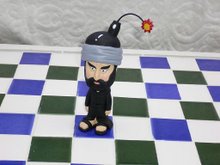
Britons get life for plotting al Qaeda bomb attacks
LONDON (Reuters) - A judge jailed five "cruel and ruthless" Britons for life on Monday for plotting al Qaeda-inspired bomb attacks on targets across Britain ranging from nightclubs to trains and a shopping center.
The trial revealed that police tracking the gang had established links between them and British Islamists who killed 52 people in suicide bombings in London on July 7, 2005.
"The sentences are for life. Release is not a foregone conclusion. Some or all of you may never be released," judge Michael Astill said at London's Old Bailey court.
"You have received and taken advantage of the benefits that this society offered you, yet you sought to destroy it," he said after one of the longest jury deliberations in British history.
The gang planned to use 600 kg (1,300 lb) of ammonium nitrate fertilizer to make bombs in revenge for Britain's support for the United States after the September 11, 2001 attacks, prosecutors said.
Britain's opposition parties and survivors of the July 7 bombings demanded a public inquiry into the deadly attacks, but Britain's Home Secretary (Interior Minister) John Reid dismissed the call, saying it was not the right time.
""I do not believe a public inquiry is the correct response at this time because it would divert the energies and efforts of so many in the security services and the police," he said.
Spies had seen Mohammed Sidique Khan, the suspected ringleader of the July 7 bombings, and accomplice Shehzad Tanweer with the men in the days leading up to their arrest, but discounted them because they were not involved in the plot.
"We were deceived," said Jacqui Putnam, who was on board an underground train blown up on July 7.
"We were told that these four characters were not affiliated with al Qaeda and were working entirely independently. We were told that, when it was known that they weren't -- because they had been under surveillance."
The government praised the police for their work.
"Five dangerous terrorists are now behind bars thanks to the hard work of our police and security services," Reid said.
"It's not the first time they have averted a very serious threat to life in this country. This is an endless task."
AL QAEDA "BEHIND" PLOT
Counter-terrorism experts said the gang could have produced a "formidable weapon" more powerful than some of the devices used in devastating attacks around the world in recent years.
"There is no doubt at all the carnage would have been immense," London's anti-terrorism chief Peter Clarke told Reuters. "I have no doubt at all they are clearly linked straight into the heart of al Qaeda."
Prosecutors said the men only needed to decide on a target when they were arrested in 2004 before carrying out what would have been the first homegrown attack by Islamic militants.
After the longest terrorism trial in British history, the men -- Omar Khyam, Anthony Garcia, Jawad Akbar, Waheed Mahmood and Salahuddin Amin -- were found guilty of plotting to cause an explosion likely to endanger life.
"You are considered cruel, ruthless misfits by society," said the judge as he passed sentence.
Two other suspects were cleared of all charges.
The conspiracy, dubbed the "British Bomb Plot" by U.S. officials, was said by prosecutors to be truly international.
Training was carried out at camps in Pakistan; technical help with detonators was provided by Canadian Momin Khawaja.
The chief prosecution witness was U.S. militant turned informant Mohammed Babar, a self-confessed al Qaeda supporter who set up the camps but testified against his co-conspirators.
Babar agreed to give evidence as part of a plea bargain negotiated in 2004 after he admitted a number of terrorism offences in New York.
(Additional reporting by Luke Baker and Peter Graff)
- Full Coverage: Terrorism & 9/11





No comments:
Post a Comment